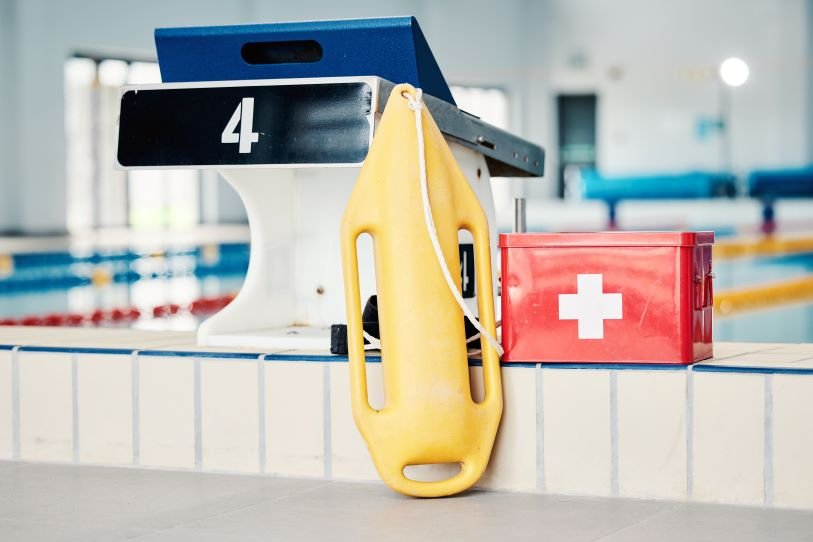
As the “Sunshine State,” Florida is renowned for its year-round warm weather and abundant bodies of water, making it a hot-spot for swimming and pool-related activities. However, this popularity comes with a price: significant safety concerns, particularly regarding drownings and other pool-related injuries.
Ensuring water safety is not only a matter of personal vigilance, but also involves adhering to established safety measures and legislation. Let’s explore the critical aspects of pool and water safety in Florida, emphasizing the importance of stringent safety practices to prevent tragic accidents.
The Importance of Safety to avoid Drownings, Near Drownings, & Other Injuries
Safety around water is crucial, whether it is a bathtub, pool, lake, or the ocean. Not respecting a body of water can lead to dire consequences.
In the U.S., drowning is the leading cause of injury-related death among children aged 1 – 4 years, and most of these drownings occur in home swimming pools. In addition, – according to the CDC – for every child who dies from drowning, another five receive emergency department care of nonfatal submersion injuries, (the result of being under water), which can cause severe brain damage and long-term disabilities. Implementing proper safety measures and ensuring constant supervision can dramatically reduce these risks and ensure a safe environment for ALL swimmers.
Florida and Pool-related Deaths and Injuries
The fact that Florida leads the country in drowning deaths of children ages 1 – 4, and has one of the highest rates of drowning among all children. These statistics underscore the critical need for comprehensive water safety interventions and public awareness campaigns to address this growing public health issue. Here are some of the measures residential pool owners need to take to ensure the safety of kids and ALL swimmers, per The Residential Swimming Pool Safety Act:
1. Install Barriers
Pool fences should surround ALL sides of the pool and be AT LEAST 4-feet-high with self-closing and self-latching gates.
2. Safety Covers
Using safety covers that meet the American Society for Testing and Materials (ASTM) standards to cover the pool when it is not in use.
3. Alarms
Installing gate and pool alarms that alert if someone enters the pool or falls in the water.
4. Water Safety Plan(s)
It’s crucial to have a clear set of rules for pool use and ensure that all family members understand basic water safety principles.
Measures for Community Pools and Pools at Recreation Centers and Clubs
Operators of community pools and clubs need to enforce even stricter safety protocols due to the higher use base and varied skill levels of swimmers. Risk management encompasses the prevention of injuries to patrons and staff of a facility, as well as minimizing legal liability. Essential safety measures include:
1. Lifeguards
It is crucial to employ trained and certified lifeguards who are constantly vigilant.
2. Regular Inspections
Operators must conduct daily checks of the pool and surrounding areas for potential hazards.
3. Emergency Preparedness
Pool management personnel must ensure that life-saving equipment is accessible, and staff are trained in CPR, first aid, and emergency response procedures.
4. Health Standard
Operators must maintain proper chemical levels and hygiene practices to prevent infections and ensure clear, safe water.
Legislation that has provided Better Safety Standards
As noted above, Florida has implemented substantial legislation aimed at improving pool safety standards. The most significant has been the Residential Swimming Pool Safety Act, which mandated barriers and safety features for new residential pools. More recently, updates to the legislation have focused on enhancing the requirements for pool covers and alarms, demonstrating Florida’s continued commitment to reducing accidental drownings through legislative action.
The attraction of Florida’s pools and beaches is undeniable, but without the proper safety measures, this allure can quickly turn to tragedy. It is imperative for both private pool owners and public pool operators to strictly adhere to safety protocols and for the state of Florida to continue advancing legislation that protects its residents and visitors. As individuals, embracing a culture of safety and vigilance can significantly reduce the incidences of drownings and injuries. By fostering an environment where safety protocols are rigorously implemented and followed, Florida can continue to be a place where water activities are enjoyed without the overshadowing threat of preventable tragedy.
Has Your Family Suffered due to an Injury suffered at a Pool or Accidental Drowning? Talk to the Experts At GOLDLAW
The Accidental Drowning Lawyers at GOLDLAW will take the time to investigate the details of your case and work alongside you to determine the most advantageous legal strategy to pursue and obtain the most compensation possible for your injuries or loss of life due to the negligence of someone else. To find out more, “Choose the 2’s,” and call GOLDLAW at 561-222-2222, or click here for a COMPLIMENTARY case evaluation.



